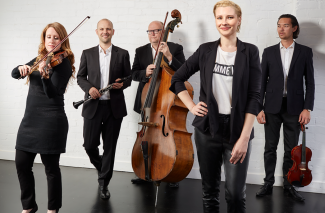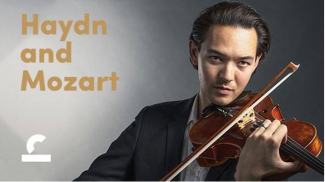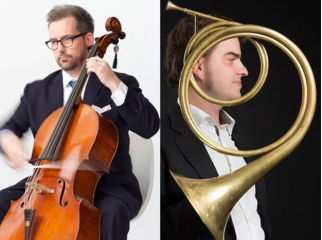Concert Review: A Brahms Affair/ Omega Ensemble

A Brahms Affair
Omega Ensemble
City Recital Hall
7 September, 2016
At the vanguard of performing live clarinet repertoire in Sydney, Omega Ensemble presented A Brahms Affair, featuring the swoon-worthy later works of Schumann, Borodin and Brahms in configurations of 2, 4 and then 5 players.
Omega Ensemble co-directors clarinettist David Rowden and pianist Maria Raspopova began with Schumann’s Fantasiestücke opus 73, (1849) in its original version for clarinet and piano, composed during a time of prolific chamber music output. The aptly titled cameo gives free reign to quicksilver changes of mood and breadth of emotion; the movements unleash a spectrum of emotions which both Raspopova and Rowden realised with dexterity and aplomb. Partners in performance, creativity and in life, their collaboration is infused with a special spark. Rowden drew from his clarinet the sweetest and softest of sounds, never compromising the quality of tone and skimming nimbly through the ‘lively and light’ second movement. Raspopova, was a supportive and sympathetic accompanist, unobtrusive but emerging with her soloistic skills when required, especially during the brilliant interplay between the two parts in the third movement.
The string players of the Omega Ensemble – violinists Alexandra Osborne and Veronique Serret, violist Neil Thompson and cellist Paul Stender – convened for Borodin’s String Quartet No 1 in A major. Although it was his first string quartet it was sketched late in Borodin’s life in 1875, developed in 1877 and completed in 1879, when he was 46, just 8 years before his death. Inspired by a theme of Beethoven and incorporating a variation of that theme, the string quartet tracks even further back in time, integrating fugal patterns into its texture as well as drawing on a Nationalist aesthetic with Russian folk themes. It was a tremendously sophisticated performance from the four musicians, navigating the technical demands of a gently tripping first movement complete with shimmering harmonics at its close, the sombre fugue of the second movement with its throbbing end and the fourth movement with its restless syncopation. There were many fine solo moments, but first violinist Alexandra Osborne was surely the “first among equals” with her brilliant playing and nuanced leadership.
Brahms’ Clarinet Quintet opus 115 (1891) is another late Romantic work which was premiered by none other than the Joachim Quartet led by Joseph Joachim with clarinettist Richard Mühlfeld whose talents tempted Brahms out of compositional retirement to write this enduring masterpiece.
This was an achingly beautiful performance with a deeply luscious string sound overlaid by the silken smooth seduction of the clarinet. The poignancy of alternating major and minor tonalities was interspersed with lively declamatory passages. Rowden’s rhapsodic clarinet playing over tremolandi strings in the second movement entered into a subtly shaded dialogue with Osborne’s first violin, colluding in final rising arpeggios. The mercurial leaps of the third movement attested to Rowden’s expert playing. Osborne navigated the ensemble through some exquisitely teased tempi in the fourth movement which also offered a brief solo opportunity for cellist Paul Stender.
The players needed little invitation to perform their encore – the final movement of Weber’s Clarinet Quintet in B flat major opus 34 (which the ensemble will perform in July next year). Rowden was clearly champing at the bit to perform this bravura party piece. Buoyant strings supported Rowden’s dazzling display, his clarinet squealing exquisitely with delight through rapid-fire arpeggiated and scalar passages.
Omega Ensemble’s A Brahms Affair was an evening of unfettered emotion underpinned by elegant and impressive playing. More than simply entertainment and excellence in performance, the ensemble is vital to keeping alive and developing chamber music repertoire in Sydney – especially that which focuses on the clarinet.
Shamistha de Soysa for SoundsLikeSydney©







